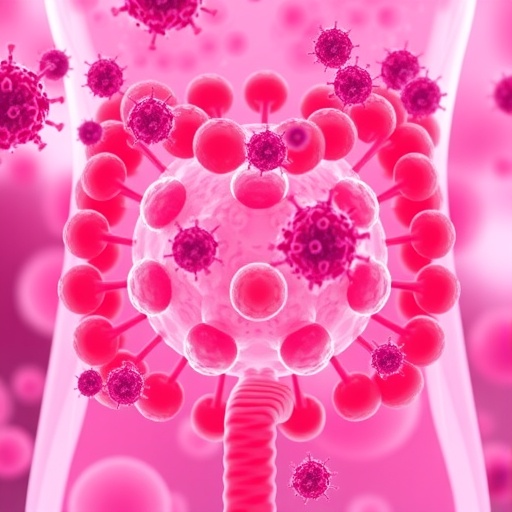In a groundbreaking advancement poised to reshape the therapeutic landscape of colorectal cancer (CRC), researchers have uncovered pivotal insights into the role of neutrophils through the lens of single-cell RNA sequencing. This novel approach sheds light on the complex interplay between neutrophil differentiation and immunotherapy response, offering newfound biomarkers and therapeutic targets aimed at enhancing patient outcomes in CRC—a malignancy long recognized for its clinical and biological heterogeneity.
Colorectal cancer remains a leading cause of cancer-related mortality worldwide, and although immunotherapy has heralded a new era in cancer treatment, its efficacy varies dramatically among patients. A pressing challenge in oncology is the identification of reliable biomarkers that can predict which patients will derive significant benefit from immunotherapeutic agents. Against this backdrop, the study delves into the largely unexplored terrain of neutrophils within the CRC immune microenvironment.
Neutrophils are traditionally viewed as first responders in inflammation and infection, but emerging evidence suggests their dualistic role in cancer progression and immune modulation. Yet, their specific contribution to immunotherapy response in colorectal cancer has remained enigmatic. By leveraging single-cell RNA sequencing technology, the researchers profiled the transcriptomic landscape of neutrophils at unprecedented resolution, dissecting their differentiation trajectories and molecular identities among CRC patients undergoing immunotherapy.
The study involved 19 colorectal cancer patients, including those treated with immunotherapeutic agents as well as control individuals. Through meticulous analysis of single-cell RNA data, scientists identified a subset of genes intrinsically linked to neutrophil differentiation—a cluster subsequently termed Neutrophil Differentiation-Related Genes (NDRGs). Trajectory analysis, a sophisticated computational technique that maps cellular developmental paths, enabled the pinpointing of nine key genes (TMBIM6, CTSS, CYCS, DDX3X, DYNLL1, LGALS1, GANI2, RPS29, and TUBA1A) with vital roles in neutrophil biology and CRC immune dynamics.
Notably, the study revealed a significant shift in neutrophil subtypes following immunotherapy treatment: there was a discernible decrease in inflammatory neutrophils coupled with an increase in immune neutrophils, highlighting a nuanced remodeling of the tumor immune milieu. This compositional change provides a compelling narrative about how immunotherapy can sculpt the immune infiltrate, possibly steering it towards a more effective anti-tumor response.
Building on these molecular insights, the researchers harnessed the nine NDRGs to construct a predictive model capable of forecasting individual responses to immunotherapy. This model stands out for its potential clinical utility, offering a tangible tool to stratify patients based on their likelihood of responding to immune-modulating treatments. Such precision medicine approaches are essential in mitigating unnecessary exposure to ineffective therapies and optimizing therapeutic regimens.
Beyond diagnostic and predictive facets, the study ventured into therapeutic discovery by conducting an extensive drug screening to identify compounds targeting the NDRG profile. Intriguingly, Ivermectin emerged as a promising candidate, suggesting that repurposing this antiparasitic agent might augment immunotherapeutic efficacy by modulating neutrophil-related pathways.
The implications of these findings resonate deeply within the field of oncology and immunology. They underscore the plasticity of neutrophils within the CRC microenvironment and their potential as dynamic biomarkers and actionable targets. Furthermore, the integrative use of single-cell technologies exemplifies how high-resolution genomic data can unravel complex cellular ecosystems, driving innovative strategies against cancer.
This innovative research not only enriches the biological understanding of neutrophil function in cancer but also charts a course toward enhanced immunotherapy personalization. As immunotherapy continues to evolve, integrating cellular-level insights such as NDRG expression patterns could refine treatment selection, leading to improved survival and quality of life for colorectal cancer patients.
Moreover, the identification of drugs like Ivermectin with the potential to interface with neutrophil differentiation pathways opens exciting avenues for combination therapies, where existing drugs can be leveraged to potentiate immune responses against tumors. Such multidisciplinary approaches hold promise for expediting the translation from bench to bedside.
In conclusion, this study heralds a paradigm shift in colorectal cancer management by illuminating the complex roles neutrophils play within the tumor milieu and their influence on immunotherapy outcomes. Through advanced single-cell transcriptomics and robust computational modeling, it paves the way for novel biomarkers and therapeutic strategies that may unlock higher response rates and durability of cancer treatments.
As the oncology community continues to embrace precision immunotherapy, findings like these serve as pivotal milestones, highlighting the intricate connections between immune cell differentiation and therapeutic success. This research exemplifies the power of cutting-edge molecular techniques to transform our understanding and treatment of cancer, promising a future where therapies are not only more effective but also intimately tailored to the patient’s unique tumor biology.
Ultimately, these insights into neutrophil biology could herald a new era in CRC care, fostering a future where immunotherapy is no longer a hope for some but a defined path to remission for many. With continued exploration and clinical validation, the nine NDRGs and their associated pathways may soon become integral components of precision oncology toolkits worldwide.
Subject of Research: Neutrophil differentiation-related genes and their role in immunotherapy response prediction in colorectal cancer.
Article Title: Single-cell RNA sequencing reveals neutrophil differentiation-related genes for immunotherapy response prediction in colorectal cancer.
Article References:
Wang, L., Wu, H., Chen, Y. et al. Single-cell RNA sequencing reveals neutrophil differentiation-related genes for immunotherapy response prediction in colorectal cancer. BMC Cancer (2025). https://doi.org/10.1186/s12885-025-15355-7
Image Credits: Scienmag.com




